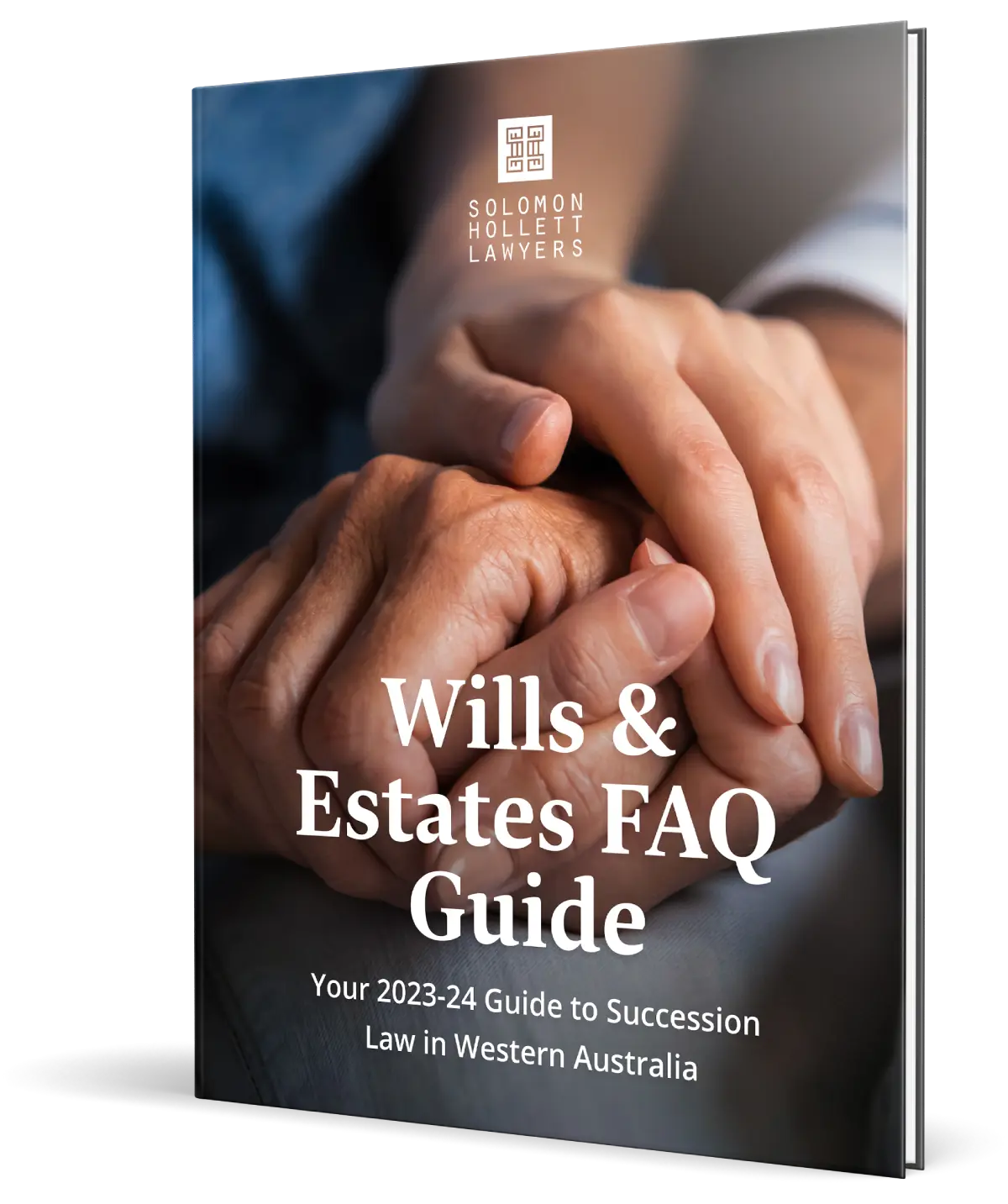Estate litigation & inheritance
Estate disputes, challenges to Wills and estate litigation are on the rise and have been year on year for the past decade or more. Why? Family structures and dynamics are more complex, blended families are more common, asset structures are more complex, and we live in a wealthy country where there is more at stake than ever before. We are experts in this area of law with a wealth of experience behind us both on the front end when it comes to estate planning – helping clients best protect their wealth and ensure the right legacy is left behind, and on the back end, with estate dispute and litigation where we help clients right the wrongs.



Who can challenge a Will in Western Australia?
- Parents
- Married spouses
- De Facto spouses
- Ex spouses – if you were maintaining them
- Children
- Grandchildren – if you were maintaining them
- Grandchildren – if their parent, your child, has died before you
- Step children
There are also other types of estate challenge, common ones being where a person has helped build up an asset of the deceased or is owed a debt they need to claim.
The power of having the right legal experts in your corner
When it comes to defending a Will, our job is to help clients defend their valid position as beneficiary when others come out of the woodwork with spurious or frivolous claims. Having to defend your position is often incredibly stressful and can be quite traumatic. Having the right legal representation on side is critical from day one; the right strategies employed from the get go can see conflict resolved quickly with far less impact from both an emotional and commercial perspective. Often there are strategies that can be employed very early on to either minimise the damage or even get rid of a claim before legal proceedings start.
On the other side of the coin, we also act often for claimants, and our job is to ensure we help right the wrongs when potential beneficiaries are left out of a Will or an Estate when they shouldn’t have been, or they haven’t been left perhaps what they should have. Squaring the ledger helps distribute the right assets to the right people for the right reasons.
If you feel you’ve been improperly left out of a Will or an Estate, or have been left with an unfair portion of an inheritance, or if someone is contesting a Will against you, we’ll sit down with you and answer all the questions you may have, we’ll look at best case and worst case scenarios and help you weigh up, both commercially and emotionally, whether you’d like to contest or how best to defend. We’ll give you a clear picture of what your prospects of success are.
We will give you an honest assessment of the strengths and any weaknesses of your position and again when it comes to the other side’s possible defences or claims.
A lot of what we do comes down to strategy and knowing how and when to act for maximum value and effect; devising legal strategies to benefit you and your position is part and parcel of the process. Indeed, if you are starting or defending proceedings without a strong sense of what your ultimate game plan is, you are not starting or defending them properly and you increase your risk of ending up with a poor result.
Part of any legal proceedings you are engaged in includes knowing what the process will look like step by step, how long it will take, and how much it will cost. When it comes to how much you may benefit from your claim, considerations will include factors such as the size of the estate, any benefits you’ve already received, financial contributions you may have made to the deceased, your own financial position, needs of the other beneficiaries, promises made and other provisions within the Will. It is vital to remember that there is no one size fits all in Estate challenges. Each one is unique, and each one has its own subtleties and complexities – and that is where our vast experience comes into play.
We can help you through the entire process, from start to finish, and represent you in Court if it goes that far. Often even after a matter has resolved, either by negotiation or Court order, implementing the outcomes requires careful consideration to make sure outcomes are adhered to.
Timing is critical in Estate claims and there are strict time limits that apply. Do not delay seeking advice if you believe a Will needs to be challenged or defended.
Our client testimonials
From individuals to families, from startups to large corporates, professional groups to charitable foundations - we've stood beside a diverse range of clients helping them best navigate their legal journeys. Here’s what just some of them have to say.

Morgan Solomon

Brandon Hetherington

Morgan Solomon

Andrew Bower

Craig Hollett
Discover the Solomon
Hollett difference
Personalised legal solutions
Comprehensive legal knowledge
Client-centric approach
Proven track record
Accessible and timely legal services
Transparent and up front
Estate disputes and how we can help
Frequently
asked
questions
Can’t find what you are looking for?
How do I ensure my fostered child benefits but their birth parents do not?
No two Wills are the same – you can write a Will which makes specific provision for a foster child, or a friend, or a charity or a family member or whoever you like.
But to make sure the foster child does not lose their inheritance it must be put into trust – and there are many kinds of trusts.
In this case, it might well be that a testamentary trust is included in a Will which says that the money is to be used for specific purposes only, e.g. education or schooling or holidays or the like, until the child becomes an adult, then they get what’s left in the trust to use themselves. Not only that, but the trust could specifically say that none of the money is to be given to the foster child’s parents or other family, for example. Trusts are capable of being very customised to say whatever you want to happen to the money. It is not unusual for such a trust to say that only a limited amount of money is to be given to the child each year until they turn 21, or 25, or even older.
In this sort of case, who you appoint as trustee of the trust is very important. If you appoint someone who is not easily able to resist the overtures of the foster child’s parents, then they may simply succumb. However, if you appoint good independent trustees who are confident in their role, they will be much more able to say no when someone comes asking for handouts.
How do I split the estate fairly when the partners to a relationship brought unequal contributions?
Splitting your estate based on contributions is entirely within your rights when drafting your Will. Remember though, that what you leave a partner in a Will may be a very different amount that what you might want them to have if you are divorcing or terminating in the Family Court. The concept of contributions is very much looked at in Family Court proceedings, and less so in Will disputes. When you write your Will there is a presumption that the relationship with your partner is going to last forever – if the relationship is rocky or you are intending to divorce or split, then it calls for a very different approach to writing your Will.
That said, if you had, for example, an inherited beach house that you received from your mother which you wanted to go to your children, and not your partner, that is a very usual consideration to include in a Will.
However, if in doing that you are not leaving enough for your partner to survive, then you can see that even though that beach house may be a family heirloom, you are depriving your partner of the necessary and adequate provision.
You can see that there is never a one size fits all solution in how you write a Will – everyone is unique, so talk to us about how your own particular scenario can be properly dealt with.
How can I stop a sibling my parents don’t speak to from getting any of their estate?
The short answer here is you can’t. But your parents can.
They can write Wills that exclude that child, or make only modest provision for them. Importantly, much depends on how wealthy that excluded child is, the nature of the relationship with the parents, how estranged they are, whether this is any disentitling conduct or a host of other reasons that are unique to each family.
In this sort of situation we also often advise the Will writers to create statutory declarations setting out the true story of why they are not leaving anything to that child, so that at least their story can be told when they are gone.
Another strategy is for the parents to consider some asset restructuring, to either give assets away before they die, or transfer them into trusts or other ways to make sure the amount they leave in their Will is less. Superannuation can be an extremely effective tool for such scenarios here.
As each family and the assets they hold are unique, speak to us about developing some strategies here to create the best outcome.
I’m about to remarry, how do I ensure my children from my first marriage secure their share of the estate should something happen?
This is a very common question and scenario. Blended families are also one of the most challenging areas of modern estate planning because you have to carefully balance provision with new partners, step-children and your own children.
Remember that you are free to leave our estate any way you wish – you can leave everything to the cat home if you want. But the Court says you have a moral obligation to provide for those who are dependent on you or in need.
So, your new partner may be in need and require you to leave them assets to make sure they are housed and fed and such, but then again, dependent on their own financial resources, you may not have to.
Similarly, if you have young children who rely on you, your obligation to provide for them is much higher than if you have adult children who are out in the world making good lives for themselves and are not reliant on you.
But ultimately, the short answer is you can use trusts to make sure you provide for both you new spouse and your own children. The big question however, is how much provision you make, and that really depends on your own personal circumstances. We regularly create Wills for blended families where each spouse leaves assets to each other in a trust, for their lifetime to make sure they are looked after, and when both of the spouses are gone, then assets split down family lines back to children. There is no one size fits all solution here, but we deal with it regularly and we’ll be able to give you the right advice when we know more about your own family dynamic.
How can I ensure one of my children don’t benefit from my Will but that their children do? And how do I stop my child’s partner getting anything?
This is a very common request and question, and one for which there is an easy answer.
The answer is trusts. Trusts can be used here to ensure that money leapfrogs a generation and goes down to the next, but who you appoint as trustees is very important as well as making sure that the children themselves are not needy or dependent and so have claims of their own against your Will that might succeed.
This is a balancing act, making sure proper and adequate provision is made for your beneficiaries and it is always a question of evaluating who is in the spectrum of possible claimants.
It is also very common for parents to want to make sure their children, or grandchildren, don’t get inheritances that will end up in the pockets of their spouses, and again the answer is trusts. They can be used to make sure that partners and spouses don’t get access to it, especially via divorces or terminations of relationships.
I’ve loaned/gifted money to one child and not the other/s – how do I accommodate this in my Will to ensure it’s fair?
This is not unusual, but needs some delicate balancing to make sure things even out.
The start is usually to record the existence of the loans or gifts, and whether they are to be repaid, or taken into account in making provision in a Will, or not. Without any good evidence of the gift or loan being made, we often see families fight over this as it comes down to ‘he said/she said’. Good documentation is the key and can be a very effective way to ensure everyone starts on the same page.
What do I need to know about blended families?
There really is no such thing as a ‘traditional family’ anymore, with blended families and stepfamilies more common than not. This has clear implications for estate planning, and in particular we see more and more clients asking us what their obligations are in relation to their stepchildren, and how to protect any inheritance they wish to give their natural children, where there is only a limited relationship with the stepchildren, or alternatively how to protect their stepchildren’s inheritance from the other parent.
As you will see under our heading ‘Who can challenge my Will?’, stepchildren can make a claim against an estate if they were being maintained by the deceased, or if the deceased stepparent had themselves inherited the stepchild’s own parent’s assets. If you have no significant relationship with your stepchildren, and they are not dependent on you, then in most cases you are not restricted from leaving them out of your Will, but you must be careful in how you go about it. What becomes tricky, is where you do want to leave something to your stepchildren, but you also need to ensure that your stepchildren’s’ inheritance is protected from their surviving parent. The best way to do this is via a discretionary testamentary trust.
What if both parties are deceased but one party had remarried? Does the estate go to the second partner or the children of the first marriage?
This really depends on firstly, whether there is a Will, and secondly, what that Will says.
Good Wills make sure they accommodate these sorts of things, but poor Wills can fall well short and leave head scratching ambiguity. That can lead to the parties having to seek the intervention of the Court to interpret the proper meaning of the Will, which can be very expensive indeed.
If there are no Wills, then there could be a very unpleasant outcome, depending on which family members remain alive (see FAQ ‘What happens if I die without a Will).
Book your free 15 min consultation
Discussing your situation over the phone is often the best way to start, and we’re pleased to offer all new and existing clients a free 15 minute phone consultation for every new matter. It’s a great opportunity to let us know more about the assistance you’re looking for, clarify your situation and walk you through how best we can help and what’s involved.
Fill in your details below
Contact us now to discuss your case
Discussing your situation over the phone is often the best way to start. Contact us directly to let us know more about the assistance you’re looking for, clarify your situation and walk through how best we can help and what’s involved.
Fill in your details below
Associations




